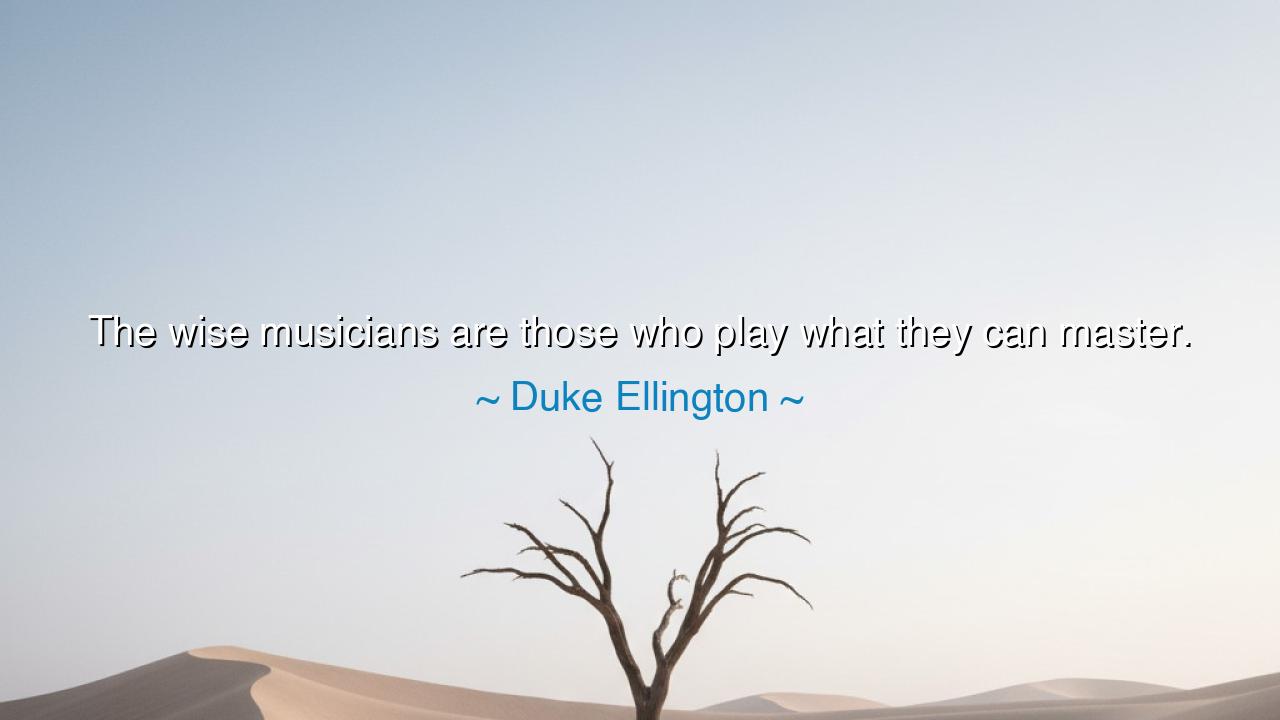
The wise musicians are those who play what they can master.






Duke Ellington, master of jazz and sovereign of sound, once said: “The wise musicians are those who play what they can master.” In this saying lies more than instruction for the artist—it is a teaching for all who strive in life. For Ellington knew that greatness does not come from reckless display or hollow ambition, but from the marriage of skill and humility, from the patient discipline of knowing one’s limits and shaping beauty within them.
To play only what one can master is to honor truth. Many chase glory by attempting what is beyond their reach, offering noise instead of music, chaos instead of harmony. But the wise know that it is better to play one note with honesty than a hundred with falsehood. Mastery is not measured in difficulty or grandeur, but in depth. A single melody, played with soul, can outshine the most complex performance delivered without heart. Thus, Ellington reminds us that wisdom lies in authenticity, not pretension.
This wisdom is not confined to music. In all of life, the one who seeks to master what is within reach, and to perfect it, is far stronger than the one who grasps at what he cannot hold. The warrior who wields a single weapon with precision will overcome the one who brandishes many without skill. The leader who governs one principle with honor will outlast the one who proclaims many with hypocrisy. Mastery, not excess, is the path to enduring greatness.
Ellington himself lived this truth. He did not seek to outplay the entire world in technical showmanship. Instead, he drew from the depth of his orchestra, weaving harmonies and moods that revealed his genius. He mastered what he loved—jazz, swing, and the art of arrangement—and through that mastery, he changed the face of music forever. His wisdom was proven in practice: by playing what he could master, he created music that endured beyond his lifetime.
History provides another example in the life of Michelangelo. Though skilled in many arts, when he painted the Sistine Chapel, he did not attempt every possible style or technique. He drew upon what he had mastered—the power of form, the human figure, the marriage of body and spirit—and in doing so, created one of the greatest works of all time. He did not spread himself thin; he focused, and through mastery, he achieved immortality.
The meaning of Ellington’s words is therefore a call to humility, patience, and discipline. Do not pretend to be what you are not. Do not chase brilliance by imitation or ambition alone. Instead, find what is truly yours to master, and give yourself wholly to it. In doing so, you will not only achieve greatness in your craft, but you will walk with the dignity of the wise, who know themselves and their power.
For those who live today, the lesson is clear: choose the path of mastery. Whatever your craft—whether music, writing, teaching, or labor—do not be tempted by the vanity of appearances. Focus instead on what you can shape with excellence. Practical steps follow: practice daily what you love, refine your skills with patience, and resist the urge to show off what you do not yet command. Let your work be honest, even if simple, for honesty carries power that pretension never can.
Thus Ellington’s words endure as a guide: “The wise musicians are those who play what they can master.” Take this as a law not only for music but for life. Master what is yours, and through mastery, create beauty that is lasting and true. For wisdom lies not in playing every note, but in playing the right ones—faithfully, powerfully, and with the fullness of the soul.






AAdministratorAdministrator
Welcome, honored guests. Please leave a comment, we will respond soon